Search
Showing 10 of 1007 results for gabrielaaa06302 of
-
International recognition for New Zealand educational robot KaiBot before official launch
The AI-enabled robot, KaiBot, which has won the award two months before its official launch date, is designed to support 5 to 15-year-old children to develop coding skills.
The Smart Toys competition is coordinated by the Dubai Future Foundation in collaboration with the World Economic Forum to highlight the best-emerging AI toys in education. The competition attracts innovators, entrepreneurs, toy developers, and start-ups from 20 countries globally.
Education New Zealand Manapou ki te Ao (ENZ) has been offering wraparound support to Kai’s Education over the last year, including supporting them to participate at EduTech Australia in August, profiling them with a spotlight feature with EdTechNZ, and offering support and insights as they venture into the UAE region.
ENZ’s Business Development Manager Alana Pellow, who has been working with Kai’s Education, said this was a fantastic outcome for New Zealand’s edtech community.
“KaiBot is a great example of how innovative and fun technology can positively impact education outcomes for young learners. It’s wonderful to see the Kai’s Education team achieve international recognition for the transformative impact their edtech has on learners.”
Read more about EdTech company Kai’s Education and KaiBot on this link.
-
Latest insights on international education
“As we approach the end of 2022, we have an opportunity to take stock, and importantly look forward to next year, one in which we all hope to welcome increasing numbers of international students back to New Zealand,” says Marie Clark, Director Insights at Education New Zealand Manapou ki te Ao (ENZ).
“Despite the long period of border closure there has been only slightly altered demand for international study. Our annual brand tracker shows the New Zealand brand is holding a strong position globally.”
ENZ has been closely tracking the beginnings of recovery. As New Zealand's border reopens, the immediate priority is for international education providers to build back their onshore offerings and attract students back to Aotearoa. The content of this issue is focussed on toward data and analysis related to our initial observations of the sector's recovery.
The Insight Story - Issue 6 includes insights on:
- Student visa applications and Study with New Zealand web stats
- New Zealand's education brand health
- Agent perceptions about international education
- 2021 international student enrolments
- New Zealanders' perceptions of the value of international students
- and more……
Visit IntelliLab to download The Insight Story here.
-
New Zealand-German university projects funded
The arrangement for the exchange of early-career academics (PPP) was signed between ENZ and the German Academic Exchange Service (DAAD) in November 2021, and applications for this round of funding closed in June. It enables young academics involved in the projects to further their careers and expand international research links.
The four successful New Zealand applications came from academics at Massey University, University of Auckland, University of Canterbury, and University of Waikato. The projects, undertaken with German university partners, cover a range of subject areas, from biotechnology and microbiology, to law and sustainable landscape development, to engineering and climatology.
This is the first time ENZ has offered funding under the PPP programme. We plan to launch a second round in April 2023 for projects that will take place from 2024 and 2025.
-
Student Ambassadors build global citizenship skills
Since it was set up in 2021, the programme has involved around 85 secondary and 50 tertiary students in six participating regions – Northland, Auckland, Tauranga and Western Bay of Plenty, Hawkes Bay, Whanganui and Wellington. Northland acted as national coordinator.
“International students can sometimes find it difficult to connect with locals, make friends or venture outside their campus,” says Sahinde Pala, GM Sector Services at Education New Zealand Manapou ki te Ao (ENZ).
“Language and cultural barriers, hesitation to meet new people, lack of knowledge of opportunities off campus, or budget constraints – many factors can play a part. The emergence of Covid-19 and lockdowns made it even more important to address these challenges, and so we worked with a range of people, including regional partners and Welcoming Communities, to develop the student ambassador programme.”
The programme has developed differently in each region, but with the same shared goals. Another common factor has been the training provided for student ambassadors – the opportunity to complete a New Zealand Global Competence certificate, training in social media, and specially tailored training provided by ISANA NZ.
“Student ambassadors are bridgebuilders and leaders, who create opportunities for students from different cultures to form relationships and learn about each other,” Ms Pala says.
“The ambassadors themselves also gain from the programme, by developing their understanding of cultural differences and learning new skills and strategies that are valued by employers. And regional communities benefit when international students feel valued and connected – they are more likely to remain in the area or recommend it to others.”
The ISANA NZ Student Ambassador Training explores intercultural concepts in an interactive and engaging format that can be run online or in-person. Participants are then able to apply their learning to develop activities and events that help students to connect with the wider community. Debrief sessions towards the close of a programme cycle support students to reflect on what they have learned from being a student ambassador.
“I enjoyed learning about how communication works between different cultures, going over cultural values and how some are visible and invisible and learning top tips to help me improve as an ambassador” – student feedback.
“Our Northland student ambassadors joined the ISANA workshop as a group of excited students interested in global citizenship and finished as a tight knit group of inter-cultural leaders in the school community. They learnt to work together, giving everyone a chance to contribute and respecting each other’s perspectives. The communication and planning skills honed in the workshop, enabled them to run a large-scale ‘Matariki Kai Festival’ event, introducing a range of food from cultures across the school to the students.” – Jo Lees, National Ambassador Coordinator and Project Manager at Study Northland.
Other activities sparked by the programme in different parts of New Zealand have included a Kiwi Cooking Class, an Auckland Weekly video series, international languages week events and Matariki events organised and run by the ambassadors, diplomatic events attended by ambassadors from other countries and an International Students Issues Panel Discussion.
One of the student ambassadors was recently profiled by ENZ: Michael Ren – Award-winning app designer eyes a future in tech | Education New Zealand (enz.govt.nz)
Several regions have indicated they hope to continue their student ambassador programme beyond 2022: Northland, Tauranga and Hawke’s Bay.
“This student ambassador training is much needed, not only for the international education sector but also across wider communities in New Zealand. In fact, I think everyone could benefit from this training if they have not received similar training before in intercultural communications and leadership,” says Wenhua Yang, Regional Manager at Learning Hawkes Bay.
To learn more about the ISANA NZ Student Ambassador Training, please contact: caroline.stevenson@isana.nz
-
Innovative leadership programme funded by PIF proves great success
The Crusaders partnered with Christchurch-based education provider Boma to develop an engaging online leadership programme sharing the Crusaders Way with rugby coaches for all age levels. The programme draws on rugby legends Scott Robertson, Robbie Deans, Kieran Read and Samuel Whitelock to help participants build a connected and skilful team.
The Crusaders chose to collaborate with Boma because of the values alignment between the two organisations, combined with Boma’s expertise in crafting compelling, impactful, scalable online learning experiences.
Boma is a recipient of ENZ’s Product Innovation Fund, which assists in the development of programmes that deliver new, meaningful and unique learning experiences from New Zealand, for the world.
The funding allowed Boma to embark into a new area and develop the Crusaders pilot programme. Boma already runs events, workshops, and courses, and has worked with leading organisations in Aotearoa and around the world. Some of Boma’s clients include IAG, Meridian Energy, Stuff and New Zealand Trade and Enterprise.
While fully on-demand online courses have been around for a long time, they typically generate low completion rates. Boma’s approach is different, creating a cohort of learners who move through the programme together, leveraging pre-recorded video with time-sensitive community engagement.
Boma founder Kaila Colbin says their unique method delivers extraordinary outcomes.
“Our programmes are designed to offer the quality and impact of Stanford, the scalability of Masterclass, and the excitement and shared experience of TED,” she says.
Kaila explains that the coaches have the flexibility to complete the course in their own time but have a sense of urgency and accountability because of the community element.
The two-week pilot was completed by 114 coaches from 14 countries. It had glowing written feedback and earned a Net Promoter Score, or NPS, of 80%. NPS is a widely used customer satisfaction benchmark in which the potential score ranges from -100 to +100. A positive score is considered good and a score above 50 is considered outstanding.
Boma has big plans for the future, growing from rugby leadership to sports leadership to business and general leadership.
Registrations are open for the next Crusaders course, which starts on 30 January 2023.
Find out more about Boma here and find out more about the Crusaders Coaching Leadership Programme™ here.
-
BINUS School Serpong wins the KIWI Challenge 2022
The winning team’s ‘Beyond Borders’ idea involved the development of a travel planning app that streamlines and personalises the travel planning process. The team also had a strong focus on local community engagement and inclusivity across people with different abilities.
The KIWI Challenge is an annual ENZ initiative run in partnership with one of New Zealand’s universities. This year Te Kunenga ki Pūrehuroa – Massey University was nominated and chose the topic of sustainable business and entrepreneurship in the tourism industry.
The competition sees participating students from schools across Java and Kalimantan provide an innovative solution or idea on a given theme.
ENZ runs the competition in collaboration with in-market partner, Kopi Tuli (Deaf Cafe), a hearing-impaired community in Jakarta. This partnership is aligned with ENZ’s strategic framework to nurture and encourage diversity, equity, and inclusion, while also showcasing sign language as one of New Zealand’s official languages.
Education Minister Chris Hipkins officially launched the 2022 KIWI Challenge during his visit to Jakarta in October.
The top prize includes vouchers worth $1,000 NZD with team members being able to undertake a virtual internship with Massey University.
The virtual internship will teach students practical skills to ‘take their idea to the world.’ Through eight hours of customised supervision from some of Massey’s academic marketing experts, students will learn how to add value to their idea and create a digital marketing plan to effectively launch their business solution.
The judging panel included ENZ’s General Manager – Marketing and Communications, Geoff Bilbrough; Massey University’s Director of Strategic Partnerships, Dr. Jeffrey Stangl; and co-founder of Kopi Tuli, Tri Erwinsyah Putra.
“I was hugely impressed with what I saw today, you [the students] can be very proud of yourselves and feel very optimistic about the future that you have before you,” Mr Bilbrough said.
Dr Stangl added, “If the future of the planet is in your [the students] hands, then we’re in good shape. Each one of the teams have thought through some very innovative ideas and solutions to problems unique to Indonesia.”
This year, the competition had 36 teams from 18 schools across the Java and Kalimantan regions participating with their innovative ideas and business pitching skills to develop their idea and create a 2–3-minute video presentation to submit to the competition.
Five teams were shortlisted to attend the finals, which were held live in-person (Jakarta) and online (Zoom). Finalists then presented their business solution for sustainable tourism, followed by a question-and-answer session with the judging panel.
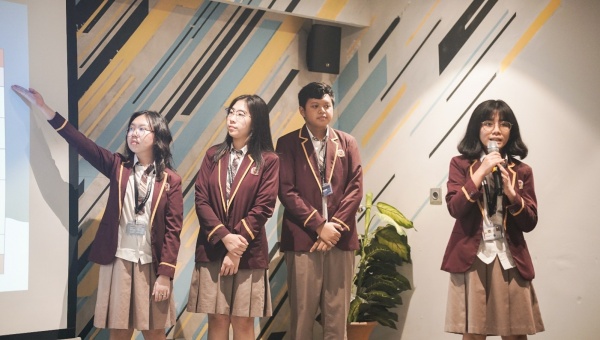
The winning BINUS School Serpong team present their ‘Beyond borders’ strategy. Pictured above (from left to right): Isabel Jo Orleans, Darlene Christabelle Wijaya, Rafael Rangga Natariano, and Calista Zahra Caesariyani
-
Huge education potential with Viet Nam
“It was a great privilege to be part of this visit. We were warmly welcomed everywhere, and there was a lot of interest in New Zealand education,” says Grant McPherson, Chief Executive at Education New Zealand Manapou ki te Ao (ENZ).
“An education forum in Ha Noi was a late addition to the programme, in response to a request from Viet Nam’s Ministry of Education and Training - this shows the high level of enthusiasm and energy for this relationship.”
Eleven representatives formed the New Zealand delegation for the education forum. Key officials and education sector representatives from Viet Nam joined the event, which was hosted by Vice Minister Nguyen Van Phuc. Institutional autonomy, scholarships, and foreign investment in education were the three main topics on the agenda, generating animated questions and discussion.
Three education arrangements were signed during the Prime Minister’s visit. The Education Cooperation Arrangement between the Ministries of Education in both countries was renewed, with the signing witnessed by the two Prime Ministers.
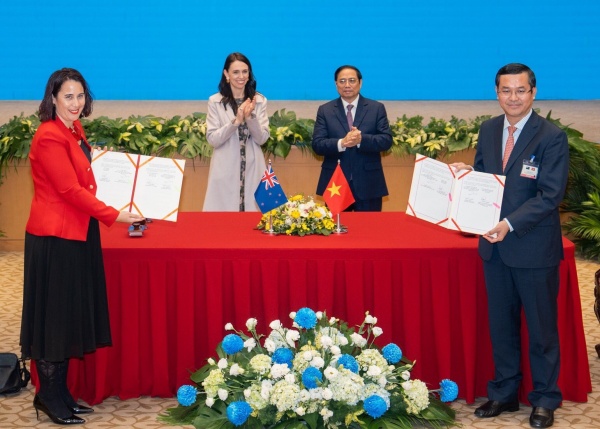
University of Auckland Vice Chancellor Dawn Freshwater also signed two arrangements with Ho Chi Minh City University of Technology (HCM-UT), relating to qualifications in computer and data science.
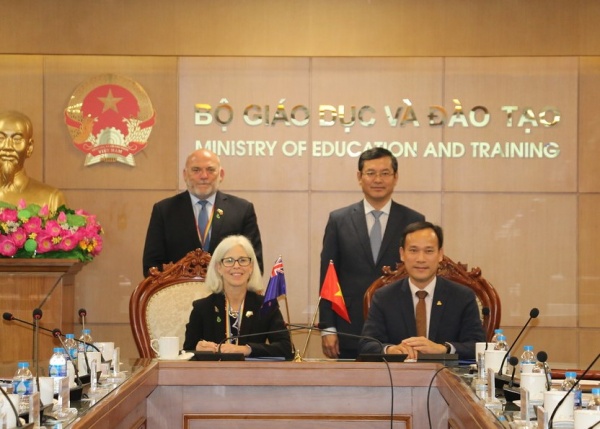
The visit also included an opportunity for the Prime Minister and the delegation to meet with around 70 Vietnamese alumni.
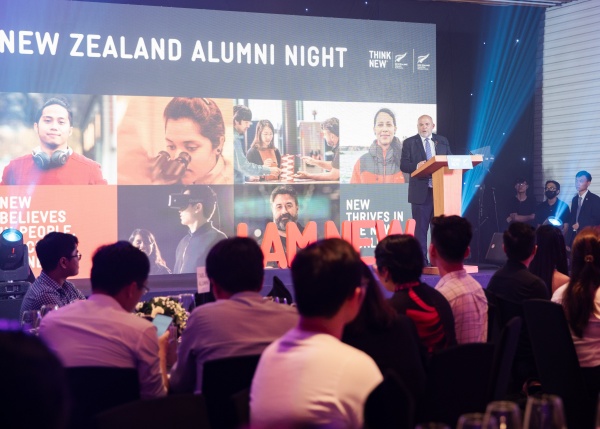
“Over the years, many Vietnamese students have studied in New Zealand, and they have become part of a network of influential alumni. These relationships span every sector of Viet Nam business and government,” Mr McPherson said.
“Five alumni showcased their businesses and social projects at the event and had the opportunity to discuss their work with Prime Minister Ardern Dave Quach, Hoa Pham, Nhien Le, Van Nguyen, and Ngan Le. Their work spanned sustainable textile manufacturing; a kindergarten that applies values of New Zealand’s early childhood education curriculum, Te Whāriki; mindfulness photography for social development; a tech-enabled platform that supports young people to pursue their study abroad dream; and an innovative agribusiness model for women of ethnic minorities in northern Vietnam.”
In recognition of the achievements of alumni and to support them as a community, Prime Minister Ardern launched a digital badge for Vietnamese alumni, I AM NEW, at the event.
Education was on the agenda at a business dialogue on 15 November and a business breakfast on 17 November provided a valuable opportunity to catch up with local institutional partners and agents.
The Prime Minister’s visit generated significant media and social media coverage in Viet Nam, and built on an earlier series of targeted events to promote New Zealand education in Viet Nam:
- Viet Nam Agent Seminars that enabled numerous New Zealand institutions to connect with education agents in Ha Noi and Ho Chi Minh City on 28 and 31 October, and where agents heard directly from Immigration New Zealand about student visa requirements
- ENZ’s Viet Nam Education Fairs on 29 and 30 October in Ha Noi and Ho Chi Minh City, enabling New Zealand providers to connect directly with prospective students and their families. These fairs generated similar levels of interest to events pre-Covid, and again included an opportunity for students to hear directly from Immigration New Zealand about student visa requirements
- Viet Nam School Leaders and Counsellors Meet-ups on 28 and 31 October in Ha Noi and Ho Chi Minh City, which enabled New Zealand tertiary providers to connect with representatives from international and private schools
- Launch of Te Pūkenga at an event that was well attended by education agents in Ho Chi Minh City on 31 October
- Education Workshop on Micro-Credentials in Future-focused Education on 1 November, in association with The MindLab and NZQA.
The sector has recognised the opportunities in education with Vietnam. Sector and government agencies’ work so far is helping to raise the profile of New Zealand and the quality of an education delivered by New Zealand.
- Viet Nam Agent Seminars that enabled numerous New Zealand institutions to connect with education agents in Ha Noi and Ho Chi Minh City on 28 and 31 October, and where agents heard directly from Immigration New Zealand about student visa requirements
-
NZGCC for teachers
Specifically designed to support teachers to teach in multicultural settings and deliver on the United Nations’ Sustainable Development Goals, the NZGCC Educator version was completed by 118 teacher participants from Malaysia, South Korea, Thailand and Vietnam in this cohort.
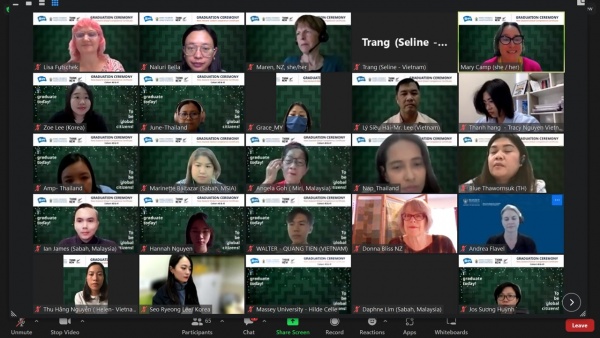
Since late 2020, around 1,415 participants have benefited from the NZGCC programme – both domestic and international students from high schools and tertiary institutions, as well as domestic and international teachers.
The NZGCC develops self-awareness, empathy, critical thinking, cross-cultural communication, conflict resolution and flexibility—skills that bridge differences and develop true global citizens. The next stage of this initiative is expected to include delivering the NZGCC to Prime Minister’s Scholars before they head off for their international education experience.
Here is a selection of the enthusiastic feedback we received from participants in these last cohorts:
“It has taught me a lot about global issues, my role as an educator and most importantly, I have learnt about myself. This course has forced me to look into who I really am as a person and how I could be a better global citizen.”
“I learnt how to be a global citizen, and the things I can do to make this world a better place, whether as an individual or as an educator.”
“Thanks to the new tools I have received from the course, I’m more confident to inspire more people from all walks of life, to step up their journey to enhance cultural competence and cultural intelligence.”
“The course is not only about how to be a global citizen. I learnt so much practical knowledge which helps to improve my skills such as communication, teamwork, and problem-solving. Thank you so much ENZ, Massey University, and AFS for such a valuable program.”
“Thank Massey University, Ms. Donna (facilitator) and ENZ for giving me such an honourable scholarship. I can’t imagine that I will have a chance to study with people from different countries with different backgrounds. By studying and doing research on the modules in the course, I not only understand myself but also know how to sympathize with others who are quite different from me. Besides, I can also apply what I have learnt to my teaching at school. I feel so lucky and proud of myself because I can step out of my comfort zone to communicate and share my own experiences with the participants as well as my beloved teacher, Ms. Donna. I love the way she listens to us and conveys her lessons. Wish Massey University, Ms. Donna Bliss and ENZ health and happiness. Hope one day I can have a chance to meet all of you in real life. See you soon. Love from Vietnam.”
-
Teaching English in Korea
The temperature drop of over 30 degrees, didn’t deter Christine Black, teacher from James Hargest School in Invercargill from enjoying a unique opportunity to teach a week-long English programme sponsored by the South Korean government.
Black and two other teachers from New Zealand, Elizabeth Henry from Kowhai Intermediate School, in Auckland and Patsy Richardson, from Te Puke School, in the Bay of Plenty were selected to teach the English programme in South Korea.
The teachers were selected through an application process facilitated by ENZ to teach 15 students from throughout South Korea about New Zealand culture and history at the JEI education centre in Cheonan from 19-23 December 2022.
Through the English Language programme funded by the Korean government, New Zealand teachers were invited to Korea to support Korean school students from rural agricultural backgrounds to extend their conversational and speaking skills. The students also engaged in hands-on classroom activities that included mini science experiments.
The one-off 2022 Korea-New Zealand English Language Training Program was sponsored by EPIS, an agency tasked by the Korean government to support English language training for Korean students and facilitated by Korea FAO Association.
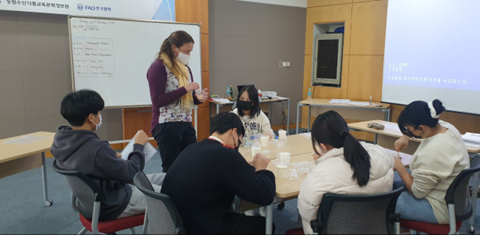
Teacher Christine Black leads the students in an experiment making slime. Photo credit: Korea FAO Association
Yoon Cho, Senior Manager of Korea FAO Association, said it was an experience the students will never forget.
“Well before the teachers arrived, they could feel their passion and enthusiasm for meeting students from rural areas in Korea. I would like to thank the New Zealand teachers who took time to visit Korea at the end of December, especially Christmas week, and made meaningful memories for middle and high school students in Korean rural areas,” Cho said.
School teacher Christine Black was excited for how her first visit to South Korea broadened her understanding of Korean culture.
“It was exciting to travel there to broaden my understanding of this culture as my high school has international students from South Korea. This definitely was a win-win situation to be able to travel somewhere new to me and also share our New Zealand culture.”
As part of the programme, each teacher was responsible for a couple of aspects of New Zealand. Black was responsible for sharing the life of a New Zealand high school student and introduce the different regions of New Zealand and their unique characteristics.
For Patsy Richardson, a teacher at Te Puke School, it was her first time in South Korea, and she introduced waiata to her homeroom group.
“I chose to teach the waiata ‘Tutira mai ngā iwi,’ with actions. We had three 30-minute slots in which to learn it and they had it perfected. Now whether that is because they are willing and diligent students, or I am such a fantastic teacher, is to be debated. The students also performed the waiata at the closing ceremony [for the programme] and it was a great display of cross-cultural connections,” Richardson said.
Despite the short time spent together, it was a great opportunity for the students and teachers to build relationships and cultural understanding between the two countries. The students in Korea were enthusiastic about speaking in English and enjoyed learning some Kiwi slang.
An intermediate school student, Kyungdon Joo, said he studied English and made new friends during the training which gave him a new perspective. “Now I have another goal: To go to New Zealand and learn more about New Zealand.”
For Elizabeth Henry, a teacher from the Auckland region, the English teaching programme was more than the opportunity to enhance language skills. Henry recognised the importance of being a cultural ambassador as she was one of the first New Zealanders the students had ever met.
“I was prepared to bring my best teaching practice to this opportunity prior to the trip not realising that once in Korea, the picture of my purpose there was so much bigger than I had anticipated. Not only did I bring my very best teaching practice to all the students I taught, my mindset changed, thinking one day these children will share this experience with their family and friends.”
Final reflections
Black reflected on the opportunity it provided for the New Zealand teachers as well as students.
“I think it is really important for teachers to grab opportunities like this, especially as there is more and more diversity in our classrooms, and it is important to get first-hand experience of other cultures.”
Henry summed up the English language teaching experience well. She hopes that whenever the students think of New Zealand “a happy memory pops into their mind from this experience.”
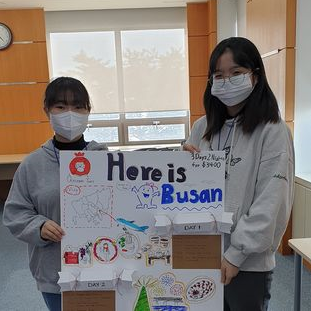
Students present their destination marketing posters Photo credit: Patsy Richardson
Education New Zealand Manapou ki te Ao would like to thank North Asia CAPE and regional education bodies for sharing the opportunity with contacts. This was a one-off overseas short-term teaching programme organised by the South Korean government. ENZ will continue to share these opportunities as they arise with education cooperation partners through the CAPE and regional education channels.
-
New Zealand Schools Scholarships relaunched in Viet Nam
The 2023 round of New Zealand Schools Scholarships – launched in January – will see 45 scholarships to 45 secondary schools offered exclusively to secondary school students from Viet Nam. Secondary schools from Kerikeri to Invercargill are taking part in what is ENZ’s latest international education initiative in Viet Nam.
This year’s initiative follows the New Zealand Education Fairs in Ha Noi and Ho Chi Minh City in October 2022 that attracted more than 1,000 attendees. The New Zealand – Viet Nam education relationship was also at the forefront of a visit to Viet Nam in November 2022 by former Prime Minister Jacinda Ardern.
Viet Nam is a priority market for New Zealand schools. Pre COVID, the sector saw 80 percent growth in students from Viet Nam between 2017 and 2019. Moreover, nearly a third (28 percent) of all international students from Viet Nam choose to study in New Zealand schools.
ENZ’s Business Development Manager Mary Camp said the New Zealand School Scholarships initiative has attracted quality students with high grade point average and good English language ability to study in New Zealand.
“Vietnamese school students are usually very committed to New Zealand, they stay for several years, experience success, and often pathway to study in New Zealand universities.
“We are delighted to welcome them back to New Zealand and eager for them to experience our quality education in a safe and nurturing environment.”
With relaunching the New Zealand Schools Scholarships for Viet Nam, it was also valuable to have the support of the Schools in International Education Business Association (SIEBA), Camp said.
“SIEBA has been supporting schools by undertaking reference checks in relation to interested education agents, thus reducing the burden on schools and helping them connect with new agents. Activating new agents in Viet Nam will help the entire sector.”
ENZ’s Regional Director – Asia, Ben Burrowes said he was pleased to support the reactivation of the New Zealand Schools Scholarships initiative in Viet Nam.
“ENZ is absolutely committed to its education relationship with Viet Nam and we’re excited to relaunch the New Zealand School Scholarships this year.
“It’s fantastic to see that our international education sector continues to foster strong education ties with Viet Nam, which is demonstrated by the number of schools offering scholarships in 2023.”
Since its launch in 2018, the New Zealand School Scholarships initiative in Viet Nam has grown to become a prestigious, top of mind scholarship for local students.
Celebrating past recipients of the New Zealand School Scholarships

Xuan Khang
Year 13, Pakuranga College
2019 New Zealand School Scholarship recipientXuan Khang came to Pakuranga College in June 2019 and graduated at the end of 2022. He remained in New Zealand throughout the pandemic, and achieved an outstanding academic record. He passed NCEA Levels 1 to 3 endorsed with Merit or Excellence gaining Excellence in both Level 3 Calculus and Chemistry. He was involved in the Academic Council, Environmental Council, the Service Council, the Cultural Council and Peer Support. Xuan Khang won Top Academic International Student at senior prizegiving in 2022 and will study Engineering at the University of Auckland in 2023.
"I came to New Zealand to broaden my horizons and become more independent. I have really enjoyed the practical aspects of working in labs and putting theory into practice. By using English daily, I feel my English has improved to a high standard. I have enjoyed being able to discuss my work with my teachers, who have been friendly and helpful. I feel I have really benefitted from the opportunities provided by living in New Zealand and studying at Pakuranga College."
- Xuan

Ho, Thi My Ha (Ha)
Year 13, Mt Roskill Grammar School
2020 New Zealand School Scholarship recipientHa began her study at Mt Roskill Grammar School in 2020. Intent on success, she achieved ‘Excellence’ endorsements at all three NCEA levels, obtaining 230 Excellence credits even before final exams. This is despite COVID lockdowns, the challenge of online learning, and not being able to travel back to see her family. Her homestay and the Mt Roskill International Department supported her during this time. At the 2022 Senior Graduation, she won the International Student Award, 1st in Level 3 accounting, 2nd in Level 3 Physics, the Hays trophy for Excellence in Commerce and the Lacy Cup for Senior literature.
“My time at Mt Roskill Grammar School was a really fun and helpful experience. One of the things I like most is how helpful everyone is. The teachers and the students are all happy to help and support each other. I also like how different it is from Vietnam because there is flexibility to choose our own subjects and how we learn. We have options about how we study and do exercises, so long as we get the results. There are a lot of extra-curricular activities and opportunities to learn new things.”
– Ha

